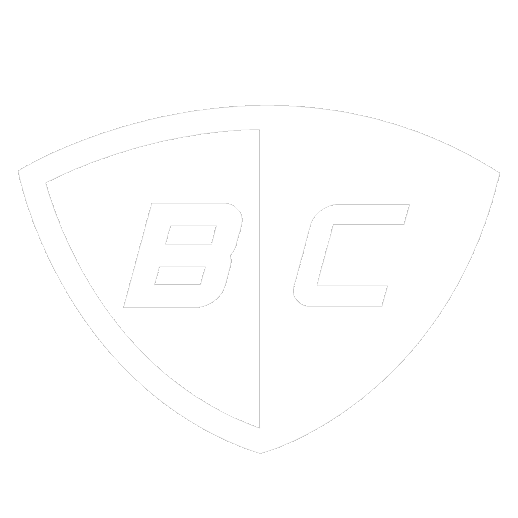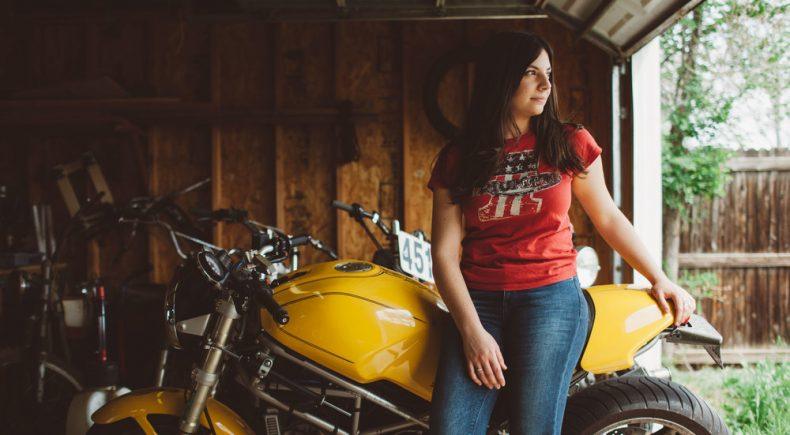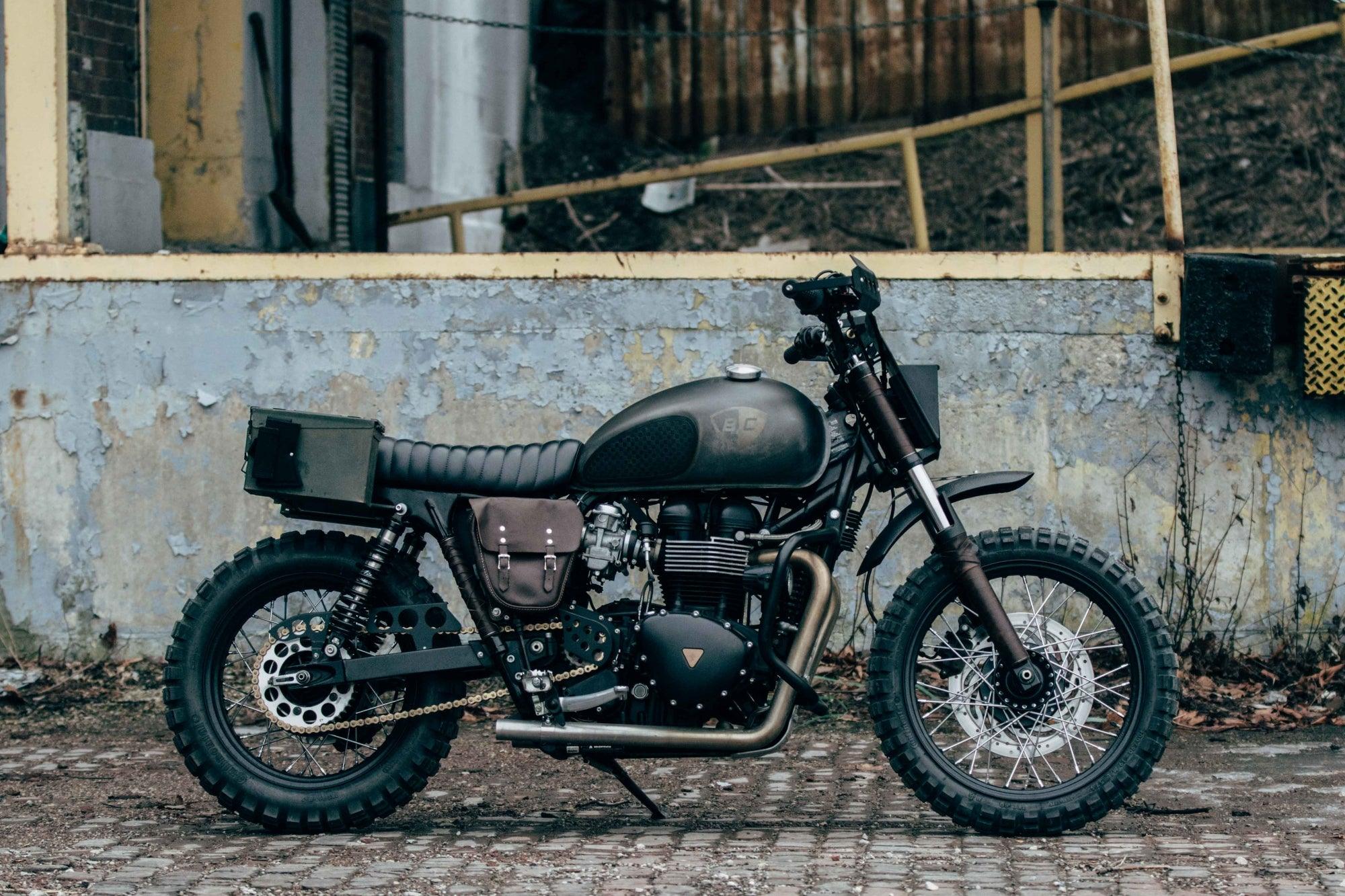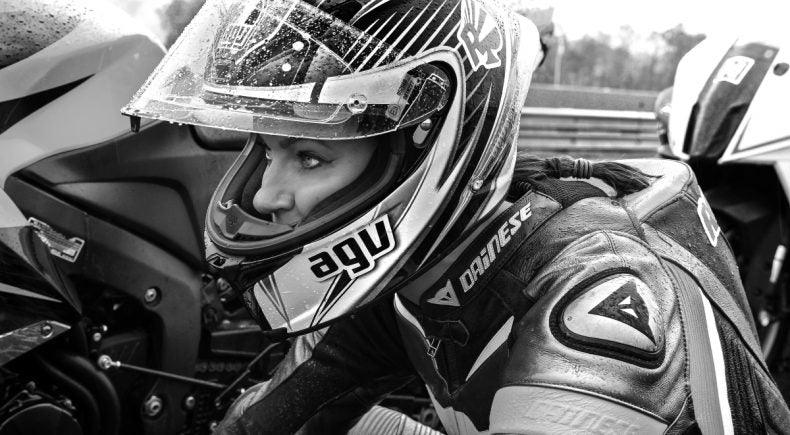
Shelby Rossi is the Founder of The Scarlet Headers, an all-female motorcycle club in Denver. She comes from a legacy of motorcycle racing, and is using that as a platform to share and grow her passion with other riders through her MC by building bikes with them, racing, and just having fun. Because, as she stresses, that’s the point, right?
British Customs: How did The Scarlet Headers get started?
Shelby Rossi: We officially got our start late in the summer of 2014. I had been working in and around the motorcycle industry for a long time, and I started seeing a female movement take place on social media. Groups like East Side Moto Babes, The Miss-Fires, We Are Hot Rides, and The Velvets inspired me. I was a woman rider, and I knew a few women riders in Denver, and I thought it would be really cool to get together and start riding as a group. So we did.
I think women love being social, so genetically I feel like we always try to turn anything into something bigger by getting organized. My boyfriend has always been supportive of women riding, and has always been there to help me. Together we came up with the name The Scarlet Headers as a parody of the book The Scarlet Letter. It started as just a casual thing, but once we had a name and started an email list, it grew pretty fast, and eventually turned into what it is today.
We wanted it be a casual, organic thing. We wanted it to be fun, and not in-your-face. We’re welcoming to everyone, and we have all kinds of bikes and riders — moms, entrepreneurs, people from all over the spectrum. We just want to go riding, and couldn’t care less about the image. We just strive to focus on why we’re getting together in the first place: to ride bikes.

Photo courtesy of @Kate_Rosee
BC: How did you grow your community?
SR: A lot of it was word-of-mouth, and just individuals sharing what we’re doing. I worked at a handful of dealerships growing up, so I know many people in both the old school and new school riding communities in Denver. So I have a pretty extensive support network since I’ve known most of them since I was a kid. Both my parents raced in MRA (Motorcycle Roadracing Association), which is based in Denver, and they’ve always been really supportive of what we’re doing as well.
Social media and being open to anyone who wants to ride with us has also been a big part of it. It connects the dots and helps like-minded people find each other. I feel like the Scarlet Headers have filled a spot because it’s such an open community: with us, you don’t have to be anything other than what you are. You don’t have to be anything specific for us all to enjoy what we’re doing together: riding.
BC: How has your experience as a motorcyclist changed since you’ve been a part of a club?
SR: I love and hate the word “community” because it’s over-used, and it’s become a bit of a cliche. But the sense of camaraderie and history in the motorcycle scene has become more apparent to me as I’ve grown up with it, which is at the core of motorcycling. With the Scarlet Headers I’ve been able to see this tie between old school and new school. A lot of people don’t realize that Colorado — and just about everywhere else — has a really unique motorcycling history, and it’s opening up with so many people coming together. There are so many cool tracks and organizations, so it’s a joy to share that history with women who had no idea. I also think that providing an environment such as one promoted by The Scarlet Headers makes getting into the sport a lot more approachable for many riders.

Photo courtesy of @Kate_Rosee
BC: You have a photograph of the leathers your mother used to race in. Was she a big influence on how you got into riding?
SR: My parents have been the biggest influencers in my riding journey. My mom and dad met in 1989 at an MRA race, and my mom was part of the first female-only race class in 1993. They’ve always been supportive of me riding since they do it themselves. My dad used to do hare scrambles, hillclimbs, and ice racing, but his biggest thing was road racing. He did it all and tried everything. He combined his passions for medicine with motorcycles and became a motorcycle doctor who worked with Superbike and MotoGP, and now is the Medical Director for Moto America. My mom stuck to road racing and ice racing, and that was something they shared.
When I was 5, my dad bought me a 50cc ItalJet as my first bike. We still have it, actually, and it still runs: we loan it to family friends and let their kids ride around on it. It’s a never-ending ride to get to loan it to the next generation of riders and see them get the passion.

Photo courtesy of @Kate_Rosee
BC: Wrenching is something you feature a lot and encourage on your Instagram feed. Why is it important to you?
SR: I feel like it’s that same mentality of if you have your own car, you need to know how to change your own tire. It helps you understand the responsibility of driving your own vehicle. But in the end, it’s really your call if you want to do that or not. It’s not like you have to be able to do everything on your own, but there’s an extra-special connection with your bike if you can work on it.
I’m not technical or scientific at all — I’m very much right-brained — but wrenching adds to the passion of the sport. It’s good to take a class on basic wrenching before buying a bike so that when you go to look at a bike, you actually know what you’re looking at.
Empowering is a strong word, but it applies here because it really means that you can do it
BC: How would you encourage someone who has never wrenched before to take that first step towards working on their own bike?

Photo courtesy of @Kate_Rosee
SR: I feel like the biggest thing I try to point out is that it’s okay to be green. So many people don’t actually know what they’re talking about; there’s so much testosterone in the industry and people who talk big because they want to make others think they know what they’re talking about. And that’s a problem because acting like that turns a lot of people off since they don’t want to seem like they don’t know anything.
Everyone is green, no one knows everything.
Having a project bike to work on with friends is great because you can all learn together. Learning with women is a very different environment because they can ask questions and share and learn together.
Our project bike has become a symbol for women who want to learn and take the next step. They want to know what happens mechanically when they’re shifting or pulling on the throttle. I want to take it to the education level. It’s helped us turn the club into this really unique community.
Even though I’ve been around it my whole life, I still don’t know everything. Everyone has more to learn. Have fun with it and help each other; be supportive.





Leave a comment
All comments are moderated before being published.
This site is protected by hCaptcha and the hCaptcha Privacy Policy and Terms of Service apply.